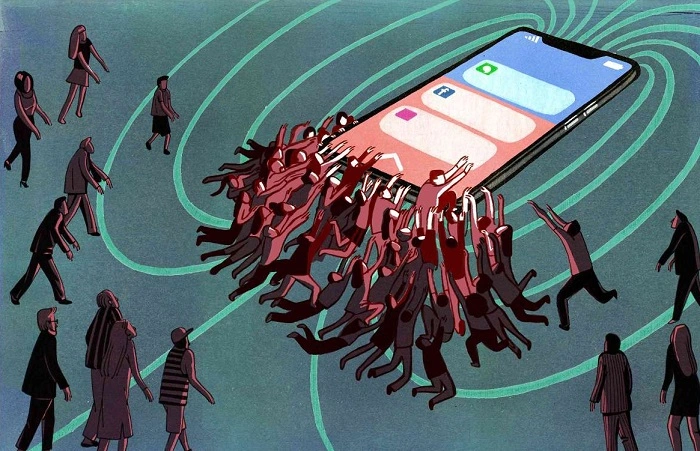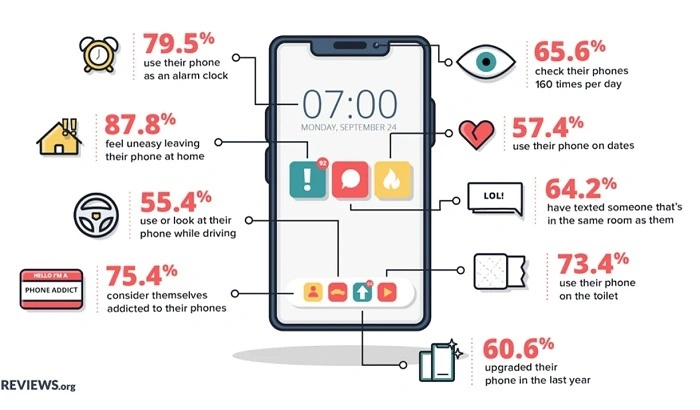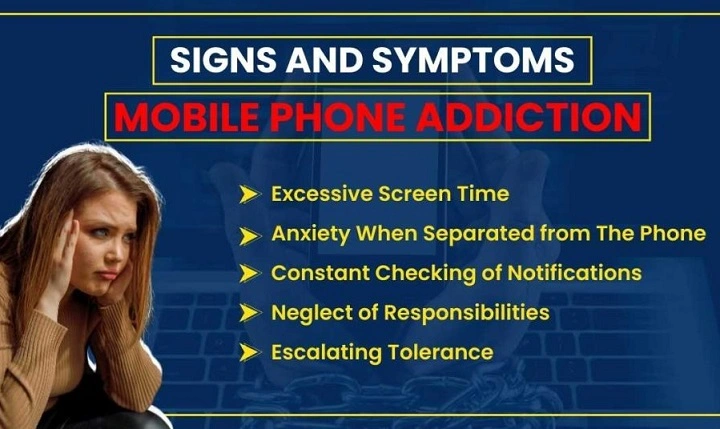Large-scale use of mobile phones is a part and parcel of modern life in the digital world. Smartphones are at the core of our lifestyles, whether it comes to keeping in touch with our friends and families or various business and entertainment activities. But as we continue to become more dependent on technology, more individuals are becoming addicted to the technology, causing what scholars consider phone addiction. Among the factors in the effort to overcome the phone addiction development, measures aimed at early prevention of its symptoms and levels are significant to reestablish the harmonious forces between online and real-life relations. The article will include the symptoms of phone addiction and the impact it has on the physical and mental health of the user and how phone addiction can be overcome to live healthy lives.
What Is Phone Addiction?

Problematic smartphone use is also called phone addiction, and it represents overreliance on mobile gadgets that negatively affects normal life, interpersonal interaction, and psychological stability. Despite the good qualities associated with smartphones, when one over-uses them, they become obsessed with their phone just like other addictions. Individuals addicted to phones can experience anxiety when they are no longer with their phone or spend hours and hours scrolling through their applications, social media, or simulations.
According to experts, phone addiction is less about time spent on the phone but rather about the psychological reliance caused by the phone. Apparently, being restless, irritable, and stressed without the phone might be a sign of unhealthy attachment.
Symptoms of commonly used phone addiction.
Phone addiction both behaviors- and physically. Checking the phone every now and again, even without active notifications is the most striking indication of this condition. Human beings can scroll endlessly on social media or go window shopping on the internet. The other common symptom is disregard of personal relationships, work or study due to overuse of the phone.
This problem of sleep disturbance also did not become an exception because a lot of people are watching their phones near sleep and that is why it is low-quality. With time, there is a chance of becoming anxious, depressed, and reduced attention span due to phone addiction. Hardware Hardware may be eye, headache and up to 8 to 10 pains in the neck or back just as long as the long exposures.
| Symptom | Description |
| Constant Phone Checking | Frequently unlocking the phone without any real purpose |
| Social Withdrawal | Neglecting in-person interactions in favor of virtual connections |
| Anxiety Without Phone | Feeling restless, anxious, or irritable when separated from the device |
| Sleep Disruption | Staying up late or waking up at night to use the phone |
| Decreased Productivity | Difficulty focusing on work, studies, or personal tasks |
| Physical Strain | Eye strain, headaches, and musculoskeletal discomfort |
Psychological Effects of Phone Addiction
The psychological effects as far as addiction to phones is concerned are disastrous. Individuals usually have short attention spans resulting in inability to focus on tasks. Social media also can cause low self esteem because they start comparing themselves with unrealistic images found on social media. Everything about excessive smartphone usage comes with anxiety and depression and in younger people.
Fear of missing out (FOMO) is another issue and the reason people always want to check updates, messages, and notifications. That would turn into a phenomenon of that sense of the need to remain in contact at all times, therefore stress and emotional burnout.
Physical manifestations of phone addiction.
One of the symptoms of dry skin, blurred eyesight and a headache is a digital eye strain that the individual will extract any other time you have screen contacts. Tech neck, back pressures and shoulder stiffness are the common results of poor posture when looking over the phone. Technology neck, backaches, and sore shoulders are usually the result of bad posture because of taking a peep at the telephone.
Other researchers are of the view that the heavy use of smartphones prior to sleep interferes with the production of melatonin, thus making it more difficult to sleep and get restful sleep. Such sleep deprivation ultimately affects the energy, mood and health.
| Health Area | Effects of Excessive Phone Use |
| Mental Health | Anxiety, depression, reduced attention span, increased stress, FOMO |
| Sleep Health | Insomnia, delayed sleep cycles, poor sleep quality |
| Vision Health | Digital eye strain, blurred vision, headaches |
| Musculoskeletal | Neck pain, back pain, shoulder stiffness |
| Emotional Health | Irritability, mood swings, dependency on virtual validation |
How to Identify If You Are Phone Addicted

Phone detection is solely a matter of self-assessment. They can either act as red flags because you spend more time on the phone chatting than you earlier expected, or it can be you are anxious because you cannot see your phone or use your phone more than the amount of time you should be learning to create personal relationships with. Embedded app monitoring time of screens could provide a clue of how the apps are used. When the phone is the first and last activity to check at the end of the day, it can also be a sign of dependency.
Also worth noting is how using phones affects productivity, relationships, and hobbies. Most people know that they are wasting numerous hours in a day scrolling aimlessly, which is one of the characteristics of addiction.
Addiction to the phone: How it can be cured and controlled.
An addict should not mean to stop using a smartphone but to find a better balance on phone addiction. Creating boundaries on screen time, in particular social media, is a great start. Switching off unnecessary alerts lowers the temptation to watch the gadget all the time.
The second resuscitation which would come would be phone off time when you would turn off phone i.e. taking up dinner or going to sleep because at that time you would be in a position to think about something and be connected with people. The concept replacing phone addiction with real-life appointments, hobbies, and physical activities can be applied to physical health as well. Severe cases should be treated to counseling/therapy, particularly where the phone addiction is connected with underlying anxiety or depression.
Frequently asked questions (FAQs)
What is the symptom of the phone addiction?
The background phone-checks, the inability to pay attention to the other occurrences that do happen in real life, the irritability of being robotish when he/she does not talk on the phone has also been attributed to the symptoms.
Do you have a phone addiction that most likely deprives you of sleep?
Absolutely. The later the use of the phone, the later disrupted the production of melatonin and caused the lack of sleep and a low sleep quality.
What can I do to reduce the symptoms of phone addiction?
Among the most adequate strategies that can aid in beating the symptoms, spending less time on the computer screen, turning off alerts, and forming the habit of not spending time with a phone should be listed.
What are the reasons that I need to get full of phone addiction, through professional help?
Once phone use starts to adversely affect your mental state, productivity or personal relations you should consider consulting a therapist or a counselor.
Conclusion
The symptoms of phone addiction are becoming too widespread due to the ruling over everyday life of smartphones. When the discovery of the signs is made at an early stage, this could also be termed as the first phase of recovery and this may also be induced by frequent investigations, isolation and sleep deprivation. Since phone addiction is both a mental and a physical disease, it is necessary to fight it with the means and styles. Setting limits and addressing the physical reality will help people to regain control over time and well-being.

